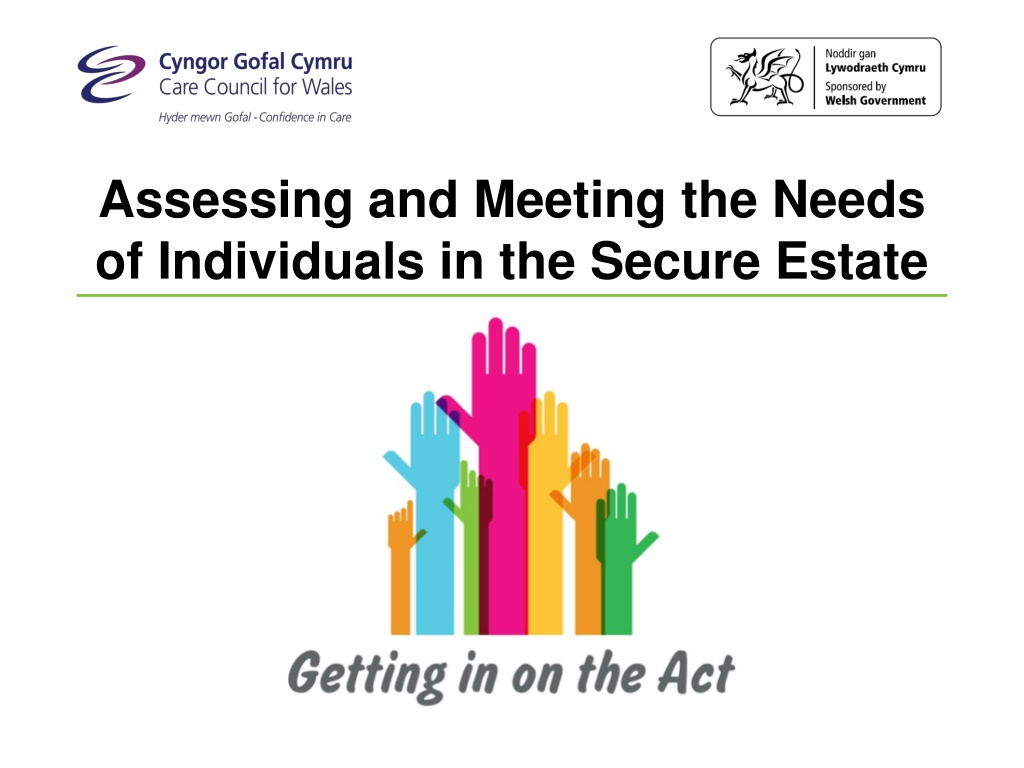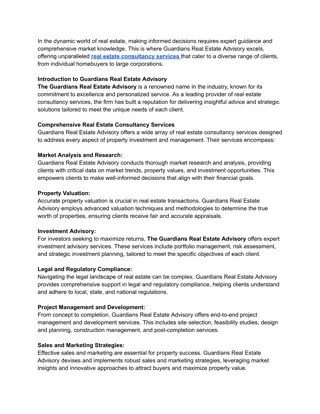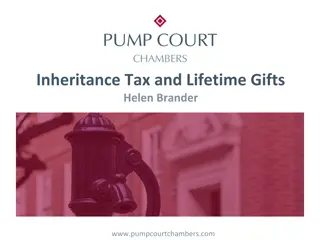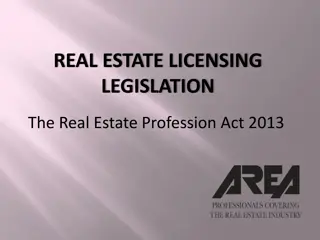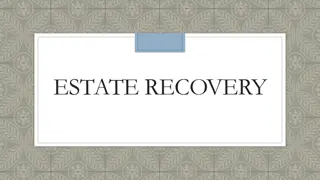Understanding and Meeting Needs in the Secure Estate
This training delves into Part 11, Chapter 1 of the Act, focusing on adults in the secure estate. Participants will grasp the aims, duties, support pathway, and implications of assessing and meeting care needs. Collaboration among agencies is emphasized, along with the Act's implications. The Social Services and Well-being Act in Wales aims for well-being, prevention, and collaboration, covering adults, children, and carers under new duties.
Download Presentation

Please find below an Image/Link to download the presentation.
The content on the website is provided AS IS for your information and personal use only. It may not be sold, licensed, or shared on other websites without obtaining consent from the author. Download presentation by click this link. If you encounter any issues during the download, it is possible that the publisher has removed the file from their server.
E N D
Presentation Transcript
Assessing and Meeting the Needs of Individuals in the Secure Estate
home_icon Aims and learning outcomes This training explores Part 11, Chapter 1, of the Act and how it applies to adults in the secure estate By the end of the training participants will: Understand the aims and ethos of the Act Be aware of the duties and powers under the Act Have explored the care and support pathway for adults in the secure estate Understand the implications of assessing and meeting the care and support needs of adults in the secure estate Understand the need for effective working across agencies, including a consideration of values, culture and communication Reflect on the implications of the Act 1
home_icon Contents Introduction and overview of the Act Adults in the secure estate Care and support pathway: pre-sentence and on reception Care and support pathway: assessing and meeting needs in the secure estate Care and support pathway: pre- and post-release Summary 2
home_icon Introduction The Social Services and Well-being (Wales) Act was implemented on 6 April 2016 It replaces many previous laws and gives effect to the policy set out in Sustainable Social Services for Wales: A Framework for Action It brings in new duties and covers adults, children and carers People Well-being Prevention Collaboration 3
home_icon The parts of the Act 3. Assessing the Needs of Individuals 2. General Functions 4. Meeting Needs 1. Introduction 6. Looked After and Accommodated Children 5. Charging and Financial Assessment 8. Social Services Functions 7. Safeguarding 11. 9. Co-operation and Partnership 10. Complaints and Advocacy Miscellaneous and General 4
home_icon The well-being duty Responsibility for well-being must be shared with people who have needs for care and support A person exercising functions under this Act must seek to promote the well-being of people who need care and support, and carers who need support 5
home_icon Other overarching duties Views, wishes and feelings of the individual Promote and respect the dignity of the individual Provide support to enable them to participate Characteristics, culture and beliefs Best placed to judge their own well-being Promote the adult s independence where possible 6
home_icon Human rights in custodial settings 7
home_icon Adults in the secure estate
home_icon Adults in the secure estate Mental health Very high levels of alcohol misuse Increasing numbers of older people Physical disabilities Learning difficulties Women prisoners release and resettlement challenges 9
home_icon The secure estate Agencies: National Offender Management Service (NOMS) National Probation Service (NPS) Community Rehabilitation Company (CRC) Youth Offending Teams (YOT) Health provision Local authorities Provision: Prisons Approved premises Bail accommodation Youth detention 10
home_icon Which local authority is responsible for adults? All adults detained in Wales Local authorities in Wales with secure estate establishment(s) within their boundaries All adults detained in England Local authorities in England with secure estate establishment(s) within their boundaries 11
home_icon Portability and cross-border arrangements Release from or transfer within the secure estate The responsible local authority may change Continuity of care The sending local authority notifies the receiving local authority Cross-border arrangements Principles of cross-border continuity of care within the United Kingdom 12
home_icon Transition Which local authority is responsible for young people who become 18 in the secure estate? The local authority where the prison is located OR The home local authority for care leavers 13
home_icon Exemptions Preference for accommodation Direct payments Property protected Be a carer 14
home_icon Care and support pathway: Pre-sentence and on reception
home_icon Pre-sentence National Probation Service Identifies any care and support needs while completing the PSR National Probation Service Completes pre-sentence report (PSR) Ask the adult s home local authority for details of any existing care and support plan Does the person appear to have needs for care and support? If yes, consider a referral to the adult s home local authority if released If yes, notify the secure estate establishment if sentenced 16
home_icon On reception in the secure estate Health staff Undertake preliminary health screening and second healthcare initial assessment within 72 hours Secure estate staff Undertake first night screening and Basic Custody Screening Tool (BCST) within 72 hours Make enquiries to the adult s home local authority Does the person appear to have needs for care and support? If yes, refer to local authority with secure establishment within its boundary 17
home_icon Care and support pathway: Assessing and meeting needs in the secure estate
home_icon Assessing the needs of individuals The right to an assessment based on the appearance of need for care and support, regardless of the level of need Aims to simplify assessments through a single process for children and adults in the community or secure estate Personal circumstances Personal outcomes Risks Strengths and capabilities Barriers to achieving outcomes 19
home_icon What matters conversations A focus on personal outcomes Sharing power and speaking as equals Exploring what is important to the person seeking care and support 20
home_icon Advocacy Can they be better supported to enable them to overcome barriers? [Reasonable adjustments under the Equality Act 2010] Might this person experience barriers in participating fully? Provide support and make adjustments Yes Yes Agree appropriate individual Is there an appropriate individual a carer, friend or relative that can support them to participate fully? Yes Do they still experience barriers in participating fully? Yes Duty to arrange for independent professional advocate No 21
home_icon Meeting the needs of individuals Advocacy: If people need help to participate, ensure assistance or advocacy is available Safeguarding: If safeguarding issues or concerns are identified, report them Local authority assessment Does the person have needs for care and support? If needs are not eligible Signpost to information, advice and assistance (IAA) and preventive services If needs are eligible Develop a care and support plan, and share with individual and key partner agencies If a care and support plan already exists Consider re-assessment IAA service Preventive services Local authority to work with the individual, and the secure estate while they are detained, to deliver the care and support outlined in the plan 22
home_icon Care and Support (Eligibility) (Wales) Regulations 2015 adults Ability to carry out self-care or domestic routines Ability to communicate Protection from abuse or neglect Involvement in work, education, learning or in leisure activities Maintenance or development of family or other significant personal relationships Development and maintenance of social relationships and involvement in the community Fulfilment of caring responsibilities for a child The need arises from the adult s physical or mental ill-health, age, disability, dependence on alcohol or drugs, or other similar circumstances As a result the adult is not able to meet that need, either alone, or with the support of willing others, or with the assistance of services in the community As a consequence they are unlikely to achieve one or more personal outcomes unless the local authority provides or arranges care and support 23
home_icon Format and content of plans Well-being, person-centred and outcome-based Clear and concise Safeguarding Integrated Based on NMDS Agreed by the local authority and health board Welsh language built in Principles Format of plans Outcomes Need for support and resources Actions and how monitored Content of plans 24
home_icon Care and support pathway: pre- and post-release
home_icon Pre-release preparation NPS / CRCW Instigate release preparation meeting to consider adult s resettlement plan Release Preparation Meeting Considers accommodation, care and support, and health needs NPS / CRCW makes referrals as appropriate Adult s home local authority undertakes an assessment or review of the plan Housing Health staff Undertake health needs assessment Undertake a housing assessment 26
home_icon Homelessness pathway milestones 1. Prior to custody Prevent loss of accommodation if possible 2. Upon reception Basic Custody Screening Tool parts 1 and 2 includes housing risk 3. 12 weeks prior to release NPS / CRCW review the individual resettlement plan 4. 66 days prior to release NPS / CRCW undertake critical review of accommodation 5. 7 days prior to release Make offer of suitable accommodation 6. Day of release Home local authority can provide relief duties 27
home_icon Summary
home_icon Summary of responsibilities for adults with care and support needs Stage Pre- sentence On reception On reception In custody Agency National Probation Service (NPS) Secure estate Responsibility Complete pre-sentence report Undertake screening Health Undertake health assessment Local authority Assessment and care planning Pre-release Community Rehabilitation Company Wales Housing Instigate release preparation Pre-release Undertake housing assessment 29
home_icon Summary The setting and procedures may be very different, but the principles and duties in the Act all apply Being person-centred, promoting well-being, and taking a preventive approach are key principles Use of the national eligibility criteria to ensure consistency of process Interagency collaboration and partnership working are crucial Effective planning and preparation for release 30
